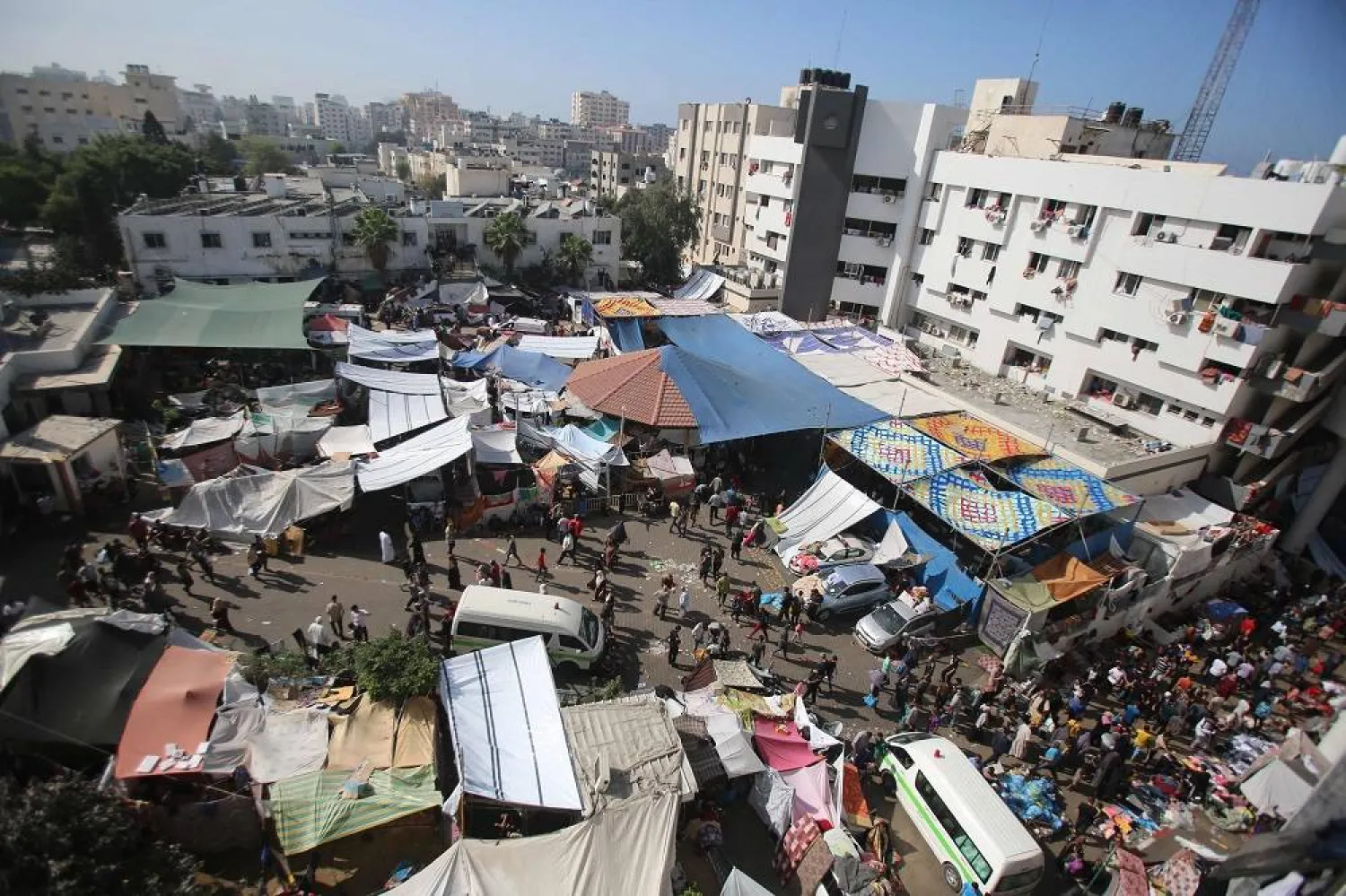The hospitals in northern Gaza were no longer functioning amid fuel shortages and intense combat, with the death toll inside the territory's largest facility rising, the Hamas-run health ministry said Monday.
Israel argues its Hamas enemies built their military headquarters under the Al-Shifa hospital complex, while UN agencies and doctors in the facility warned a lack of generator fuel was claiming lives, including infants.
Witnesses reported intense overnight air strikes, with tanks and armored vehicles just meters from the gate of the sprawling Al-Shifa compound at the heart of Gaza City, now an urban war zone.
The Hamas government's deputy health minister Youssef Abu Rish said the death toll inside Al-Shifa rose to 27 adult intensive care patients and seven babies since the weekend as the facility suffered fuel shortages.
Gaza has been reliant on generators for over a month after Israel cut off power supplies following the October 7 attack and the besieged territory's only power plant ran out of fuel.
Abu Rish told AFP all hospitals were "out of service" in the territory's north, where black smoke rose from a bombed mosque and a rare person on the street carried a white flag.
The World Health Organization in the Palestinian Territories said early Monday that at least 2,300 people -- patients, health workers and people fleeing fighting -- were inside the crippled Al-Shifa facility.
"There are dozens of dead and hundreds of wounded that no one can get to. Ambulances are at a standstill because they get shot at when they go out," hospital director Mohammad Abu Salmiya told AFP.
The Israeli army pushed on with their campaign, determined to destroy the movement whose gunmen it says killed at least 1,200 people, mostly civilians, and took about 240 hostages in the country's worst ever attack.
But Israel is facing intense international pressure to minimize civilian suffering amid its massive air and ground operations that Hamas authorities say have killed 11,180 people, including 4,609 children.
Israel said 44 of its troops have been killed in the Gaza offensive.
A lack of fuel was also hitting the UN agency for Palestinian refugees UNRWA, with the group's Gaza chief Thomas White saying operations "will grind to a halt in the next 48 hours as no fuel is allowed to enter" the territory.
Fear of regional conflict
The Israel Defense Forces on Monday reported more heavy fighting and again stressed its claim that Hamas was hiding in civilian infrastructure.
"IDF troops are continuing to conduct raids... targeting terrorist infrastructure located in central governmental institutions in the heart of the civilian population, including schools, universities, mosques and residences of terrorists," it said.
In another operation, "IDF ground troops entered the residence of a senior Islamic Jihad terrorist and located a large number of weapons inside the kids' room of the residence".
Teams of Israeli troops ran between jagged ruins in Gaza while air strikes shown on grainy military-released video shattered buildings.
Palestinian Prime Minister Mohammad Shtayyeh on Monday urged the European Union and the United Nations to "parachute aid" into Gaza, especially the hard-hit northern areas.
Israel's Prime Minister Benjamin Netanyahu has said Hamas must first release the hostages before any ceasefire would be considered, but he told US media on Sunday that "there could be" a deal in works.
Israelis are stunned by the October 7 attack and worried for the fate of the captives, with families planning to deliver a letter at the UN headquarters in Jerusalem seeking action.
The war in Gaza has also spurred concerns of a wider regional conflict.
At least eight pro-Iran fighters were killed in US strikes on eastern Syria, a war monitor said, in response to attacks on American forces.
It was the third time in less than three weeks that the US military has targeted locations in Syria, amid a spike in attacks on American forces in the Middle East linked to the Israel-Hamas war.
International concern
International attention has focused on the plight of Palestinians, and protests have been held worldwide in solidarity with the 2.4 million under bombardment and siege for more than five weeks.
Among those fleeing northern Gaza on Sunday was Adel Shamallakh, who was pushing a stretcher with four young children, some crying and shooing flies from their faces.
"The road is so bumpy, more than expected. Destruction is everywhere, even birds there have no more life."
About 980 trucks carrying humanitarian aid have been let into Gaza since October 21, according to the UN humanitarian agency.
Fuel has been a key need, especially for hospital generators, but Israel has been concerned that any fuel deliveries could be diverted to Hamas militants.
Palestinians in Gaza's south have been forced to adapt to the lack of basic resources, with many resorting to clay ovens to cook.
"People are using now (traditional) ovens in order to cook, what else can they do?" said a woman, who asked not to be named, making clay ovens in southern Khan Yunis.
Almost 1.6 million people -- about two-thirds of Gaza's population -- have been internally displaced since October 7, according to UNRWA.
Israel's military said it would observe a "self-evacuation corridor" Monday, allowing people to move from Al-Shifa southward, but admitted the area was still the scene of "intense battles".
The area of fighting "currently includes the area surrounding the Al-Shifa hospital but not the hospital itself", an IDF spokesperson told AFP.
The Israeli army also said its ground soldiers had hand-delivered 300 liters (80 gallons) of fuel near the hospital "for urgent medical purposes".
Al-Shifa director Abu Salmiya said he told Israeli authorities he needed at least 8,000 liters to run the main generators and "save hundreds of patients and wounded, but they refused".
AFP was unable to independently verify his account or Israel's claim that Hamas forbade the hospital from taking the fuel.









